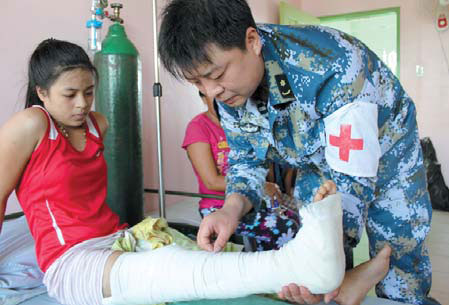As the largest hospital in the region, the LPH usually receives an average of 100 patients a day, according to Rosalle Uy, the supervising nurse. Haiyan not only damaged the buildings, but some of the medical staff also lost their lives.
"If it were not for the Chinese doctors, it would have taken a long time to reopen the LPH," said Uy, who, along with five other Filipino medical staff, is working with the Chinese doctors and nurses to help the local population.
Guan Bailin, head of the PLA navy's health department, said, "We chose this location because some of the buildings are usable, and every one knows the LPH, so it's easy for people to find us."
 |
|
Chen Ruifeng checks Joyoe Gadia, whose leg was crushed during the typhoon. Peng Yining / China Daily |
Transport difficulties
Working alongside local people and disaster relief teams from other countries, including France, the Peace Ark's crew helped repair some of the hospital's roofs and cleaned up the debris and mud in some rooms. They also erected tents to be used as storage facilities and staff dormitories and built a helicopter pad, plus a jetty for water transfers.
Standing at the jetty, which bears a painted red cross and the name "Peace Ark", the vessel was easily visible as it rode at anchor in the gulf, gleaming in the tropical sun.
The journey from the field hospital to the ship takes less than 10 minutes by helicopter and around 30 by speedboat.
"Unfortunately, transport is still a big problem for us, especially in bad weather," said Chen.
He recalled an hour he spent waiting at the jetty in a downpour with a patient. The patient was losing blood and Chen was desperate to get him aboard the Peace Ark. "The weather was too bad for the helicopter. I was very anxious as I watched the boat slowly draw closer in the choppy water. In emergencies, delays can sometimes prove fatal," he said.
Transport difficulties aside, Chen said the field hospital needs more staff and equipment to provide further treatment.
"As the only emergency surgeon, I've only had six hours sleep in the past two days, but patients with acute injuries still need to be sent to the hospital ship."
Chen is no strange to disaster relief. He participated in a two-month mission after the 2008 earthquake that devastated Sichuan province in southwestern China. He said the conditions then were much worse than in the field hospital. "I didn't brush my teeth for 10 days in Sichuan because of the lack of water," he said. "But here and now, we have sufficient supplies and have even set up a shower room."
Many of his colleagues at the field hospital have gained vast experience through their work in other disaster areas.
"Chinese medical staff have learned a lot from working after previous incidents," he said. "I'm sure our experience and the facilities we're providing mean we can really make a difference here in the Philippines."
Contact the writer at pengyining@chinadaily.com.cn
|
|
|
|
|
|
|
|
